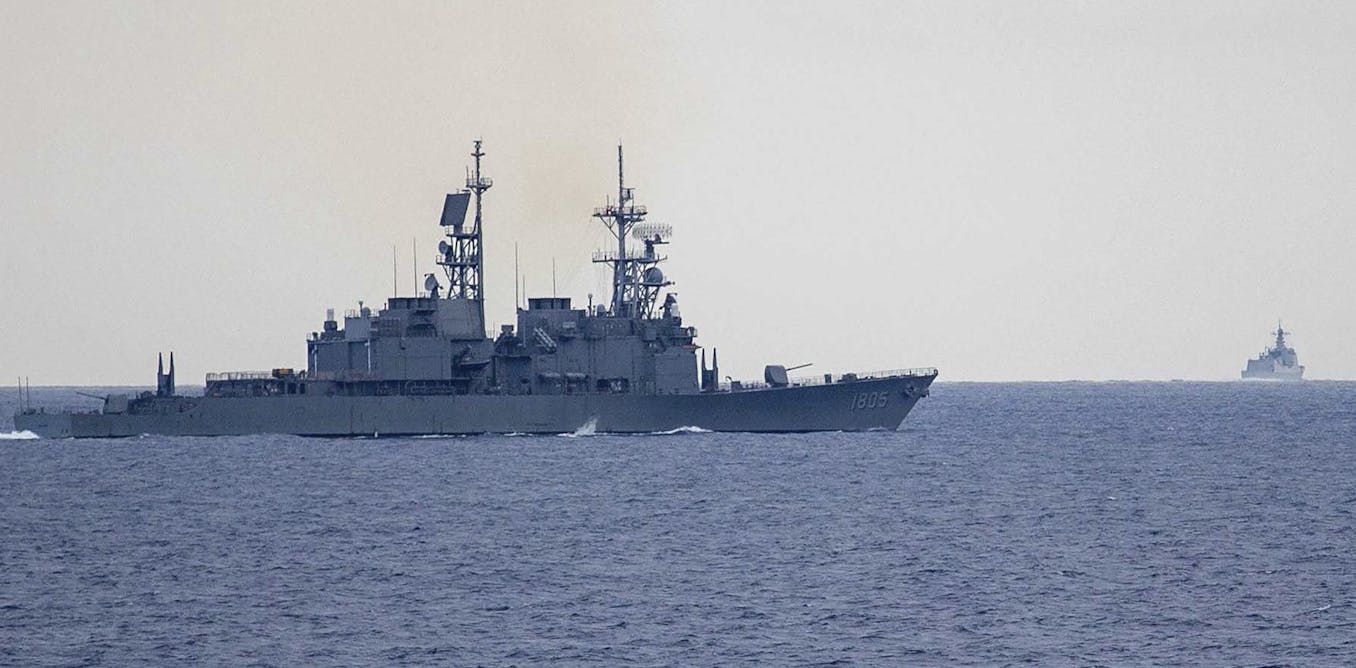By Kuan-Wei Chen, Researcher, Air and Space Law, McGill University
Taiwan recently saw yet another peaceful transition of power with the inauguration of President Lai Ching-Te, who was elected to office in January.
In his inaugural speech, Lai called on neighbouring China to cease its acts of intimidation and to “choose dialogue over confrontation.”
China responded by launching a simulated blockade of Taiwan. The People’s Liberation Army released images boasting its ability to rain missiles on one of the most densely populated countries in the world as “strong punishment.”
Democracy under threat
Beijing’s standard reaction to the democratic voting rights of 24 million people is to threaten to “break skulls and let blood flow.” For China, Taiwan as a renegade province that must “return to the embrace of the motherland” despite the fact China does not have any authority over Taiwan.
In recent years, China has been trying to use its diplomatic clout and influence at the United Nations to rewrite history and legitimize its claim of sovereignty over Taiwan.
While Taiwan ranks highly on the Human Freedom Index (just one spot ahead of Canada), China is a techno-authoritarian state that has regressed even further under the reign of Xi Jinping.
Millions of Uyghur Muslims remain in re-education and forced labour camps, while Tibetans are forced to “Sinicize” and lose their cultural and religious heritage. Reaching beyond borders
Political dissidents, journalists and foreign nationals are not immune from intimidation or imprisonment.
In what has been termed transnational oppression, aided through Chinese so-called police stations operating with impunity overseas, the Chinese government targets and threatens Chinese nationals and critics of China wherever they are.
Reaching beyond borders
Political dissidents, journalists and foreign nationals are not immune from intimidation or imprisonment.
In what has been termed transnational oppression, aided through Chinese so-called police stations operating with impunity overseas, the Chinese government targets and threatens Chinese nationals and critics of China wherever they are.
Many governments, including Canada’s, caution against travel to China and Hong Kong due to the “risk of arbitrary enforcement” of laws prohibiting activities or speech critical of the Chinese Communist Party.
China’s censorship, surveillance and arbitrary arrests are widespread, and such tactics and technologies are alarmingly being exported worldwide.
While the Chinese government condemns the forced divestment of TikTok, the app — together with Facebook, WhatsApp and Google — are all banned within the great firewall of China.
War games
When former United States House Speaker Nancy Pelosi visited Taiwan in 2022, China conducted similar war games.
Known as “grey-zone” tactics, they fall short of the use of force, which is prohibited under international law. Also referred to as “salami slicing,” grey-zone tactics that are not strictly attacks make it hard for others to respond without potentially escalating a situation to a conflict.
But not responding to threats of force or military intimidation risks normalizing such aggressive behaviour and emboldening China to further destabilize international peace and stability.
Such acts of harassment and threats can happen not just on Earth but in cyberspace and outer space, all of which can have severe repercussions on civilian life and infrastructure.
Pattern of reckless behaviour
Closely allying with Russia, and actively supplying weapons to sustain its war in Ukraine, China has not concealed its desire to reshape the world order.
Taiwan is not alone suffering China’s increasingly brazen naval and aerial military operations. Canadian and Australian aircraft enforcing United Nations sanctions against North Korea have also been repeatedly harassed on international waters, where states supposedly enjoy the freedom of navigation.
Meanwhile, China is continuously engaged in violent border clashes with India, is challenging the sovereignty of islands that belong to Japan and militarizing islands in the disputed waters of the South China Sea.
Deliberate jamming of navigation and emergency distress signals in the Asia-Pacific, which threatens the safety of international aviation, has also been attributed to China.
Why Taiwan matters
Tech executives around the world were recently in Taiwan to talk about the future of AI and innovative technologies. With Taiwan’s prowess in computing technologies and chip production, Jensen Huang — the Taiwanese-born NVIDIA CEO — described his homeland as “the unsung hero, a steadfast pillar of the world.”
But Taiwan is also on the front lines of an increasingly aggressive and assertive China. On a daily basis, Taiwan experiences the highest rate of cyberattacks in the world originating from China, all aimed at disrupting government services and sowing social distrust.
Taiwan has much to share with the world on how to enhance citizen participation in the digital age, counter foreign influence and dispel misinformation and disinformation that undermine trust in democratic institutions and processes.
The latest war games surrounding Taiwan are just another reminder of the various ways China tries to undermine liberal democracies and international peace and security. Today it may be a simulated attack. But the world must stand together and prevent it ever becoming reality.



The US military is not pushing for endless war. That would be the country actively supplying an imperialist dictator’s illegal invasion.
I disagree.
Our gov’t and military has been in non stop wars since our founding.
With small spands, some say 17yrs, of peace here and there, but ghost wars and militias we fund are also a thing to take note of.
Our country has between 700 and 1000+ military bases outside of the US, not to mention it is used to aggravate two superpowers, Russia and China.